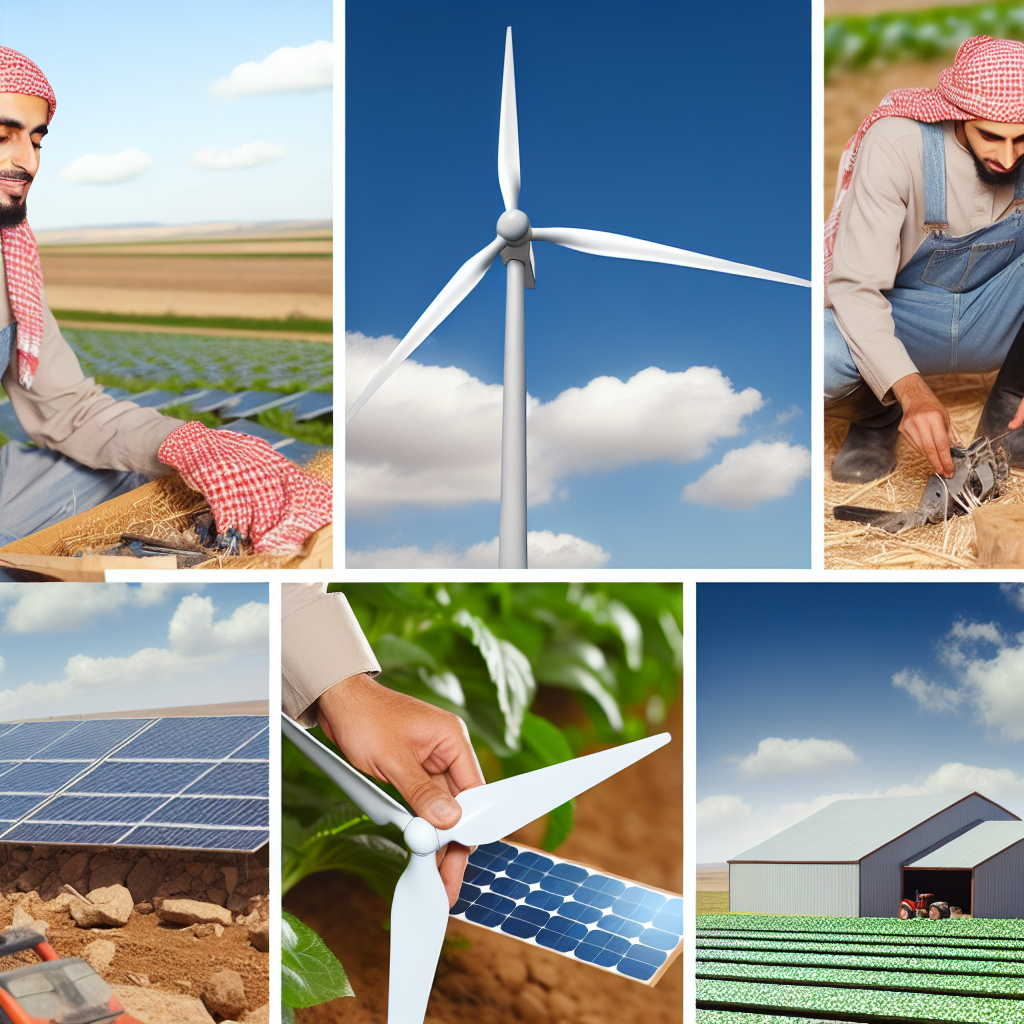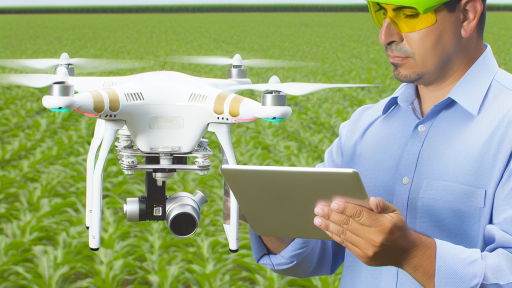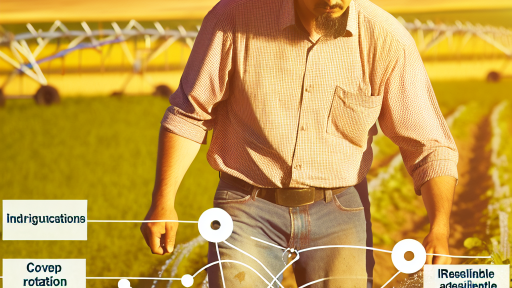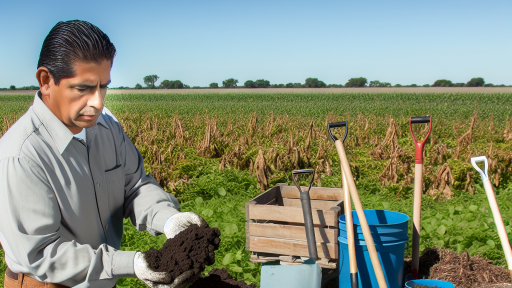Introduction to Renewable Energy and Its Importance for Sustainable Farming
Renewable energy plays a crucial role in sustainable farming.
It contributes to reducing greenhouse gas emissions effectively.
Sustainable farming methods focus on long-term ecological health.
Farmers increasingly seek to implement renewable solutions.
Benefits of Renewable Energy in Agriculture
One significant benefit includes cost savings on energy bills.
Renewable energy sources are often more reliable than traditional ones.
They offer independence from fluctuating fossil fuel prices.
Additionally, these energy sources reduce operational risks associated with climate change.
Types of Renewable Energy Suitable for Farming
Solar energy stands out as a leading choice for farmers.
Photovoltaic panels can power irrigation systems effortlessly.
Wind energy also presents a viable option for many agricultural settings.
Biomass energy harnesses organic materials to produce usable energy.
Hydropower uses water flow to generate electricity, benefiting specific farms.
Implementing Renewable Energy Solutions
Farmers can start by assessing their energy needs thoroughly.
Evaluating available renewable resources is vital for effective implementation.
Transform Your Agribusiness
Unlock your farm's potential with expert advice tailored to your needs. Get actionable steps that drive real results.
Get StartedConsulting with renewable energy experts can provide valuable insights.
Moreover, seeking grants and funding can help offset initial costs.
Challenges and Considerations
Transitioning to renewable energy can involve challenges.
Farmers may face high initial investment costs.
Understanding local regulations on renewable installations is essential.
Moreover, long-term planning is necessary for sustainable energy systems.
Overview of Different Renewable Energy Sources
Solar Energy
Solar energy harnesses sunlight to generate power.
It is a clean and abundant energy source.
Solar panels capture sunlight and convert it into electricity.
This technology reduces reliance on fossil fuels.
Farmers can install solar arrays on rooftops or fields.
Additionally, solar water heaters can provide hot water for livestock.
Wind Energy
Wind energy captures air currents to produce electricity.
Tall wind turbines convert kinetic energy into power.
Farmers can use wind farms to generate a significant energy supply.
This source of energy is renewable and sustainable.
Furthermore, it can lower energy expenses on farms.
Wind energy projects can also provide income opportunities.
Biomass Energy
Biomass energy relies on organic materials for power generation.
Common sources include plant waste and manure.
This form of energy reduces landfill waste while producing fuel.
Farmers can use biomass for heating and electricity.
It supports a circular economy by recycling waste products.
Moreover, it helps mitigate greenhouse gas emissions.
Showcase Your Farming Business
Publish your professional farming services profile on our blog for a one-time fee of $200 and reach a dedicated audience of farmers and agribusiness owners.
Publish Your ProfileGeothermal Energy
Geothermal energy harnesses heat from the Earth’s core.
This resource is stable and consistently available.
Farmers can utilize geothermal systems for heating greenhouses.
Additionally, it can warm livestock facilities in colder climates.
Geothermal energy reduces the need for fossil fuels.
This method is environmentally friendly and efficient.
The Role of Solar Energy in Sustainable Agriculture
Harnessing Solar Power
Farmers actively use solar panels to generate electricity.
This renewable energy source significantly reduces electricity costs.
It provides a reliable power supply for various farm operations.
Consequently, solar energy enhances overall farm sustainability.
Innovative Applications of Solar Technology
Many farms have started employing solar water pumps.
These pumps help in irrigation, making water management efficient.
Moreover, solar heating systems support greenhouses during cold months.
This method improves plant growth and crop yields.
Financial Benefits of Solar Energy
Investing in solar energy offers long-term financial savings.
Government incentives make solar installation more affordable.
Farmers can sell excess energy back to the grid.
This generates additional revenue and offsets installation costs.
Environmental Impact
Solar energy provides a clean alternative to fossil fuels.
It reduces greenhouse gas emissions associated with agriculture.
Furthermore, it promotes the responsible use of land and resources.
By adopting solar technology, farms contribute to environmental protection.
Successful Case Studies
Sunny Acres Farm utilized solar energy to power its operations.
Their solar panels meet most of their energy needs during the day.
This initiative reduced their carbon footprint significantly.
Another example is Green Fields Agribusiness, which uses solar fences.
These fences help protect crops and conserve energy.
Learn More: Enhancing Soil Health through Carbon Sequestration
Utilizing Wind Power for Agricultural Efficiency
Introduction to Wind Energy in Farming
Wind energy is becoming a significant force in sustainable farming.
Farmers can harness this renewable resource to enhance efficiency.
Moreover, wind power reduces operational costs in agriculture.
Case Studies of Successful Implementation
Many farms have successfully integrated wind turbines.
For instance, Green Acres Farm installed wind turbines last year.
This initiative reduced their electricity costs by 40%.
Similarly, Sunny Fields has reported increased crop yields with wind power.
Wind Turbines and Crop Yield Enhancement
Wind turbines help manage the microclimate on farms.
They provide consistent airflow that benefits plant growth.
Furthermore, they can deter pests from crops, reducing pesticide use.
Benefits of Wind Power in Agriculture
Utilizing wind energy offers multiple advantages for farmers.
- Decrease in electricity expenses allows reinvestment in the farm.
- Improved sustainability enhances the farm’s reputation.
- Wind power diversifies energy sources, ensuring reliability.
Environmental Impact
Wind energy contributes to reducing greenhouse gas emissions.
Showcase Your Farming Business
Publish your professional farming services profile on our blog for a one-time fee of $200 and reach a dedicated audience of farmers and agribusiness owners.
Publish Your ProfileThis transition supports global efforts to combat climate change.
Additionally, it promotes biodiversity in agricultural landscapes.
Challenges and Considerations
Despite its benefits, adopting wind power also poses challenges.
Initial installation costs can be a significant barrier.
Farmers must also consider local regulations regarding wind turbines.
Moreover, they need to assess the wind resource availability on their land.
Addressing Common Concerns
Many farmers worry about the visual impact of wind turbines.
However, well-placed turbines can blend into the landscape.
Additionally, noise from turbines is often overstated.
Future of Wind Power in Agriculture
The future looks promising for wind power in farming.
Technological advancements are making turbines more efficient.
Farmers increasingly recognize the long-term benefits of renewable energy.
As adoption grows, innovative solutions will emerge for diverse farming needs.
See Related Content: How Farmers Are Battling Heatwaves and Drought with Innovation
Biomass Energy: Converting Agricultural Waste into a Sustainable Energy Source
Introduction to Biomass Energy
Biomass energy harnesses organic materials for energy production.
This renewable energy source utilizes agricultural waste effectively.
It transforms what would be considered waste into valuable resources.
Moreover, it plays a significant role in sustainable farming practices.
Sources of Biomass Energy in Agriculture
A variety of agricultural residues contribute to biomass energy production.
Corn stover is a prominent example, readily available post-harvest.
Other sources include straw, fruit pomace, and animal manure.
These materials are abundant and often underutilized in farming systems.
Techniques for Conversion
Several techniques exist for converting biomass into energy.
First, anaerobic digestion breaks down organic material in the absence of oxygen.
This process produces biogas, which can be used for heating or electricity.
Next, direct combustion involves burning biomass to generate steam and electricity.
Lastly, fermentation converts sugars in biomass into biofuels like ethanol.
Benefits of Biomass Energy
Utilizing biomass energy provides numerous environmental benefits.
It reduces reliance on fossil fuels, cutting greenhouse gas emissions.
Additionally, it improves waste management by repurposing agricultural by-products.
Furthermore, biomass energy supports local economies by creating jobs.
Challenges and Considerations
Despite its advantages, biomass energy has challenges to address.
One crucial issue is the supply chain for collecting and processing waste.
Sustainability must be ensured to avoid over-extraction of resources.
Moreover, farmers need education on best practices for biomass utilization.
Successful Case Studies
Various farms have implemented biomass energy solutions successfully.
For instance, Green Acres Farm in Indiana uses corn stover for power.
This initiative has significantly reduced their energy costs while promoting sustainability.
Additionally, Maple Leaf Farms employs anaerobic digestion to process poultry waste.
They generate biogas that powers operations and supports local energy needs.
Showcase Your Farming Business
Publish your professional farming services profile on our blog for a one-time fee of $200 and reach a dedicated audience of farmers and agribusiness owners.
Publish Your ProfileExplore Further: Climate-Smart Agriculture to Combat Greenhouse Gases
Geothermal Energy in Farming: Potential and Implementation Challenges
Overview of Geothermal Energy
Geothermal energy utilizes heat from the Earth’s interior.
This renewable energy source is constant and reliable.
Farmers can harness it for various agricultural processes.
Potential Benefits for Farming
Geothermal energy can significantly reduce energy costs.
It offers sustainable solutions for heating and cooling.
Moreover, it can enhance crop yield and quality.
Farmers can utilize it for greenhouses and aquaponics.
Additionally, it promotes water conservation through efficient irrigation.
Practical Applications
Geothermal heat can be used for soil warming.
This process helps in early crop planting.
Farmers can also apply it for drying harvested crops.
Further, it supports livestock temperature regulation.
Greenhouses benefit from stable growing conditions provided by geothermal energy.
Implementation Challenges
Despite its benefits, geothermal energy has implementation challenges.
High initial capital costs can deter farmers.
Limited knowledge and technological expertise pose obstacles.
Additionally, site selection for geothermal systems can be complicated.
Regulatory and Environmental Considerations
Farmers must navigate regulatory frameworks related to geothermal energy.
Environmental assessments are often necessary before development.
Moreover, proper studies can address potential ecological impacts.
Understanding local permitting processes can facilitate implementation.
Future Outlook
Research and innovation can enhance geothermal energy adoption in farming.
Government incentives can help mitigate financial barriers.
Collaborations with energy companies can provide valuable resources.
As awareness grows, more farmers may adopt geothermal technologies.
Ultimately, this can lead to more sustainable farming practices.
Discover More: Top Carbon Sequestration Techniques for Farmers

Economic Benefits of Adopting Renewable Energy Solutions in Farming Operations
Reduction in Energy Costs
Farmers significantly reduce energy costs by adopting renewable energy sources.
Solar panels offer a reliable, long-term solution for powering farm operations.
Wind turbines can also generate electricity, lowering dependence on traditional sources.
As energy costs decrease, overall farming operation costs follow suit.
Consequently, farmers can reinvest these savings into their operations.
Increased Profit Margins
Lower energy expenses lead to improved profit margins for farmers.
With renewable energy, farmers have control over their energy production.
This control minimizes unexpected fluctuations in energy costs.
As a result, farmers can plan budgets more effectively.
Ultimately, this strategy supports sustainable farming practices.
Access to Incentives and Grants
Many governments offer incentives for adopting renewable energy solutions in farming.
These incentives can significantly offset installation costs of renewable systems.
Showcase Your Farming Business
Publish your professional farming services profile on our blog for a one-time fee of $200 and reach a dedicated audience of farmers and agribusiness owners.
Publish Your ProfileGrants and subsidies may be available for upgrading to solar or wind energy.
Taking advantage of these financial supports boosts farm profitability.
Farmers should research local programs to maximize potential benefits.
Enhanced Marketability
Consumers increasingly prefer products from environmentally responsible farms.
Adopting renewable energy enhances the farm’s image and attracts eco-conscious buyers.
This boosts marketability and can increase sales revenue.
Furthermore, merchandising eco-friendly practices differentiates farmers in the market.
Ultimately, a commitment to sustainability can lead to customer loyalty.
Long-term Sustainability and Resilience
Investing in renewable energy contributes to long-term sustainability for farms.
This shift reduces reliance on fossil fuels and lowers greenhouse gas emissions.
As climate change impacts agriculture, resilient systems become crucial.
Renewable energy sources can adapt to changing environmental conditions.
Thus, farmers can maintain productivity amid external challenges.
Improved Energy Independence
By generating their own energy, farmers enhance energy independence.
Reduced reliance on external energy sources stabilizes farm operations.
This independence shields farmers from market volatility in energy prices.
In turn, they can focus on core farming activities without energy concerns.
Ultimately, this fosters a more self-sustaining agricultural sector.
Challenges and Barriers to Implementing Renewable Energy in Agriculture
Financial Constraints
Many farmers face significant financial barriers to adopting renewable energy solutions.
Initial costs for solar panels or wind turbines can be prohibitive.
In addition, limited access to funding or grants complicates the situation.
As a result, many farms remain reliant on traditional energy sources.
Technological Barriers
Implementing renewable energy technologies often involves complex systems.
Farmers may lack the technical expertise required for installation and maintenance.
Moreover, outdated infrastructure may hinder integration efforts.
Consequently, transitioning to renewables can be a daunting endeavor.
Regulatory Challenges
Farmers often navigate a maze of regulations regarding energy use.
Licensing and permitting processes can be slow and cumbersome.
Additionally, local policies may not support renewable energy initiatives.
Such hurdles can discourage farmers from pursuing sustainable options.
Market Access and Stability
The profitability of renewable energy investments depends on market access.
Farmers may struggle to secure contracts for energy sales.
Fluctuating energy prices can further deter long-term investments.
This uncertainty complicates the decision-making process for many operators.
Social and Cultural Factors
Adoption of new technologies often meets with resistance from traditional practices.
Some farmers may prioritize short-term gains over long-term sustainability.
Community attitudes can influence individual choices concerning renewable energy.
Education and outreach efforts are crucial to shifting these mindsets.
Future Trends: Advancements in Renewable Energy Technologies for Sustainable Farming
Innovative Solar Solutions
Solar energy continues to revolutionize farming practices.
Farmers increasingly implement solar panels on rooftops and open fields.
Showcase Your Farming Business
Publish your professional farming services profile on our blog for a one-time fee of $200 and reach a dedicated audience of farmers and agribusiness owners.
Publish Your ProfileThis technology reduces reliance on fossil fuels significantly.
Furthermore, solar-powered irrigation systems efficiently conserve water.
Thus, farmers can cultivate crops with minimized operational costs.
Wind Energy Utilization
Wind turbines are gaining popularity in agricultural settings.
These structures generate clean energy, reducing electricity costs.
Farmers often harness wind energy for irrigation and equipment operation.
Additionally, some farmers sell excess energy back to the grid.
This practice creates a new revenue stream for sustainable operations.
Biogas Production
Biogas technology is a game changer in waste management.
Farmers convert livestock manure and organic waste into energy.
This process generates biogas for heating and electricity.
Moreover, it minimizes environmental pollution and improves soil health.
With biogas systems, farms become more self-sufficient and sustainable.
Advancements in Battery Storage
Battery storage technology enhances the reliability of renewable energy sources.
Advanced batteries store energy for use during non-productive hours.
This capability allows farmers to optimize energy use year-round.
Notably, such systems can power equipment during peak demand times.
As a result, farms experience increased energy independence and efficiency.
Smart Grid Integration
Smart grid technology facilitates improved energy management.
Farmers can monitor and control energy consumption in real-time.
This integration helps identify energy-saving opportunities quickly.
Consequently, farms operate more efficiently and reduce waste.
Moreover, connecting to smart grids supports renewable energy adoption.
Investments in Renewable Energy Research
Research institutions are focusing on renewable energy innovations.
These advancements promise to enhance energy generation techniques.
Moreover, farms benefit from tailored solutions catering to their needs.
Investment in research leads to accessible technologies for farmers.
This trend will accelerate the transition to sustainable energy solutions.
The Path Forward for Integrating Renewable Energy into Agricultural Practices
Embracing Renewable Technologies
Farmers must adopt renewable energy technologies for sustainable farming.
Solar panels can provide a reliable energy source.
Wind turbines offer another viable option for energy generation.
Biogas systems can convert waste into usable energy.
Embracing these technologies reduces dependency on fossil fuels.
Enhancing Energy Efficiency
Improving energy efficiency should be a priority for farmers.
Investing in energy-efficient equipment can yield significant savings.
Farmers can implement precision agriculture to optimize resource use.
This approach minimizes waste and maximizes productivity.
Government Support and Incentives
Governments play a key role in promoting renewable energy in agriculture.
They can offer financial incentives for adopting green technologies.
Grants and low-interest loans can make implementations feasible.
Showcase Your Farming Business
Publish your professional farming services profile on our blog for a one-time fee of $200 and reach a dedicated audience of farmers and agribusiness owners.
Publish Your ProfilePolicy frameworks should encourage sustainable practices among farmers.
Education and Training Programs
Education is essential for effective integration of renewable energy.
Farmers need access to training programs on new technologies.
Workshops can provide hands-on experience with renewable systems.
Collaboration with agricultural extension services can enhance learning.
Building a Sustainable Supply Chain
Integrating renewable energy enhances the entire supply chain.
Collaboration among farmers, suppliers, and retailers is crucial.
A sustainable supply chain reduces carbon footprints significantly.
Renewable energy initiatives should be aligned across all stakeholders.
Measuring Impact and Success
Farmers must track their energy use and sustainability metrics.
Implementing monitoring systems can provide valuable data.
Assessing impacts will demonstrate benefits to the community.
Successful case studies can inspire others to follow suit.
Fostering Community Engagement
Community involvement can enhance the transition to renewable energy.
Farmers can share experiences and successes to motivate others.
Local partnerships can support renewable projects and initiatives.
Strengthening community ties can result in collective progress.
Looking Ahead
The future of agriculture depends on our willingness to change.
Investing in renewable energy is essential for sustainability.
Farmers who embrace these practices will lead the industry forward.
Adopting a proactive approach will create a resilient agricultural sector.




